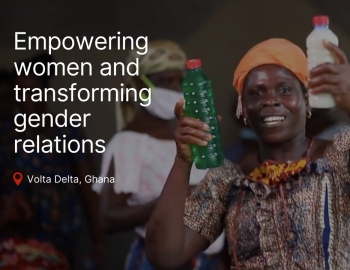Empowering women and transforming gender relations in the Volta delta, Ghana
Empowering women and transforming gender relations in the Volta delta, Ghana
The Regional Institute for Population Studies, University of Ghana, in partnership with CDKN, launched this project in July 2019.
The aim of this project is to empower women to be more resilient to the impacts of climate change. This will be done through increasing women’s capacity around land use and management through training and raising awareness on the need for women to have increased knowledge and skills around the effective use of the land they have access to. Training programmes will include; improving the capacities and skills of women in alternative livelihoods, business management and marketing, packaging of agricultural products, access to regional markets, crop diversification, value-addition to produce and accessing microfinance for their businesses.
Context
This study builds on the findings of the DEltas, vulnerability & Climate Change: Migration & Adaptation (DECCMA) study on the Volta delta region in Ghana. The findings of the DECCMA study in Ghana indicated that the constant coastal erosion of beaches and the salinization of groundwater and lagoons have adversely affected fishing and the agricultural livelihoods of coastal communities. The lack of opportunities to earn a living locally has led to the migration of able-bodied males, leaving behind the highest proportion of female-headed households in Ghana.
The initial project proposal was developed on the basis that women were left with the responsibility of taking care of their families while experiencing land access challenges from land tenure barriers due to a patrilineal inheritance system. Additionally, it built on the findings from the DECCMA study which revealed that most women have economic challenges exacerbated by climate change, and as a means of trying to overcome this, most women subscribe to microfinance/loan credit schemes, which the research showed to be a successful adaptation strategy. But in reality, many women are not able to access microfinance due to the lack of collateral and knowledge of the financing options available to them.
Project Objective
These overall objectives however, have shifted slightly as a result of findings from a Baseline Survey on Women's Land Rights which the project team conducted at the start of the project. The findings of the baseline survey revealed that the idea that men and women could have equal access to land inheritance rights is perceived by both the Chiefs and Queen Mothers as highly improbable because the patrilineal practice is strongly embedded in the traditions of the study area and within the Volta region as a whole. They however suggested that there was a need for women to be able to effectively manage the land that they have access to in order to gain maximum benefits from it. Therefore actions such as building women’s adaptive capacities and improving their agricultural activities would be very useful.
With this in mind, this project aims to empower women to be more resilient to the impacts of climate change. Training programmes will include; improving the capacities and skills of women in alternative livelihoods, business management and marketing, packaging of agricultural products, access to regional markets, crop diversification, value-addition to produce and accessing microfinance for their businesses.
Project activities
- Collaborate with the District and Municipal Assemblies in implementing the training workshop on land use and management while raising awareness on the need for women to have increased knowledge and skills around the effective use of the land they have access to;
- Monitoring and Evaluation (M&E) of women’s groups who benefitted from the training;
- Formalisation/registration of selected women’s groups;
- Community radio show engagements in Keta and Sogakope to raise awareness on women and climate adaptive livelihoods;
- Conduct training on climate adaptive livelihoods (including training to accessing microfinance) for women;
- Organise monthly informal follow up meetings with women’s groups in the project;
- Share the sensitization knowledge products on land use and management issues for women with the Customary Land Secretariat, Traditional Councils, District and Municipal Assembly Officials, and women’s groups during consultative meetings and workshops; and
- Formulate and implement initiatives towards achieving gender equality and the empowerment of vulnerable groups
Project outputs
The project’s key outputs are:
- Baseline Survey in Sogakope and Keta Municipalities on Women and Land Rights
- Social and Behavioural Change Communications (SBCC) posters in English and Ewe and an information brief that will be used to raise awareness on how women can efficiently use the land they have access to, and how to access livelihood opportunities available to them;
- A documentary film capturing gender and land rights issues in the Volta Delta region, Ghana
- A training handbook for climate-adaptive, resilient livelihoods
Partners: Pro-Link Ghana and Kulima Integrated Development Solutions (Pty) Ltd.
Photo: Women fish processors in West Africa. Courtesty of Minkoh, FAO:SFLP Project, WorldFish


